As of September 1, 1939, not all holidays were suddenly canceled, and Christmas did not disappear from the calendar. When December 24 approached, Poles looked for the first star and put hay under the tablecloth. But everything else has changed.
The Polish people are not happy about the holidays in all respects - although the latest news about war events gave some encouragement - noted in 1942 Ludwik Landau, author of the reliable "Chronicle of the years of war and occupation". He continued to write:
The turnover for the holidays has picked up a bit; The prices of meat raised to an unprecedented level (PLN 100-120 per kg of pork, PLN 500 for a goose, etc.) did not scare everyone away - but nevertheless, a significant part of the amounts prepared for the holidays have remained unsold and at the last moment the prices will probably collapse sharply.
According to this well-known economist, but also a vigilant observer of everyday life, the mood was best evidenced by abandoning traditional Christmas wishes. During the war, nobody said, "Merry Christmas!" That would stand, as Landau explained, "in too screaming contrast to reality."
The friends were only allowed to say:"have a quiet holiday." In the face of the constant fear of round-ups, and even of being hit in the hands of the Gestapo, these were extremely sincere wishes.
First war Christmas Eve
The most difficult thing was to keep the shape on the first Christmas Eve - less than four months from the moment the old world collapsed. The traces of recent fighting were all too well visible in the living tissue of cities and towns. Not all the bomb craters have been filled in, the debris has not been removed, and many of the fallen have not found a dignified burial place. As Władysław Bartoszewski writes in his memoir, published by the weekly "Stolica" in 1957, the population thought about the upcoming holidays with deep sadness.
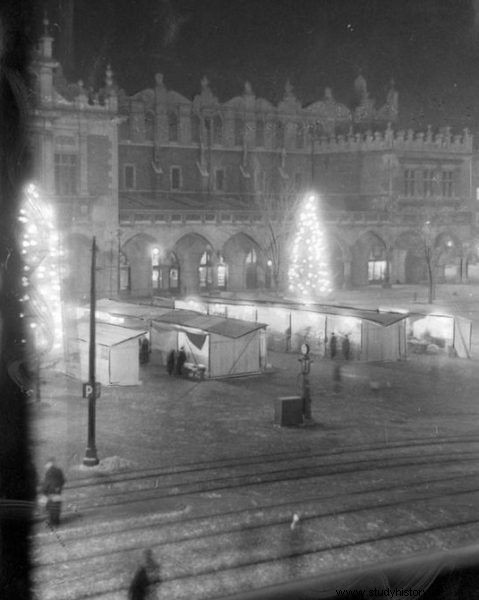
A Christmas tree in the Market Square in Kraków during the occupation.
The defeat of the September campaign and the increasingly difficult living conditions left their mark on the mood of Poles. In countless homes it was the first but not the last Christmas Eve with many empty seats at the table. The spell of bitterness was completed by the cruel crime of the Germans. On December 27, 1939, as part of retaliation for two of their officers killed by ordinary criminals, they murdered one hundred and seven residents of the Warsaw district of Wawer.
Apart from the depressed Poles, the victorious Nazis also celebrated Christmas 1939. As early as mid-December 1939, Krakow was full of Christmas accents. Gadzinówka "Goniec Krakowski" wrote about increased traffic, about vendors with Christmas tree toys, candles, sweets and, above all, Christmas trees. Christmas was supposed to be held as always - but this time it was Christmas for the Aryans and for Hitler's glory.
Despite all the adversities, the population of the occupied country did not lose heart. Wishing each other that the next holidays could be celebrated in a free country, they started preparations at the beginning of December.
A necessary Christmas tree
The Christmas tree was one of the most important elements in building the festive mood. In the realities of the occupation, its conquest and decoration became a real challenge. The future historian and filmmaker, Wiesław Stradomski, recalled that in his family home the Christmas tree was half the size it used to be. In addition, it cost as much as a dozen or so zlotys.
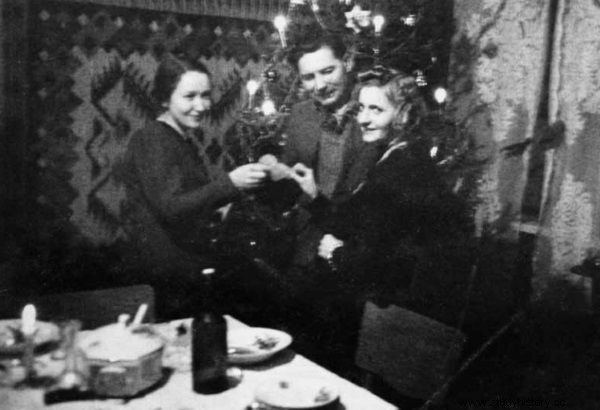
Celebrating holidays was one way to stay normal. It was uplifting and allowed me to break away from the difficult reality for a moment.
Although it was a considerable expense, everyone tried to get a tree, or at least a bunch of fir. Once inside the house the smell of pine needles, it was time to decorate the Christmas tree.
Traditionally, candles, colorful candies, walnuts wrapped in silverware after chocolate, stars made of paper and colored tissue paper, cotton wool imitating snow, angel hair and, of course, baubles were hung on it. What exactly decorated the Christmas tree depended on the current financial situation of the family, but also on the September bombing. In many houses, only broken pieces are left after the delicate Christmas balls. Marek Kolendo, who supported his family by trading cigarettes on the black market, recalled the 1941 Christmas tree years later:
Some toys and trinkets were very old, bought before Jaśka's birthday. Some survived, despite the shelling and destruction of the house in 1939. Especially three big shiny balls, navy blue and green, always hung in visible places.
Under the Christmas tree, the householders looked for gifts. During the war, these were practical trinkets that were useful every day, rather than luxury items. The children also enjoyed sweets that they did not eat on a daily basis.
Of all the festive bustle, however, the Christmas Eve menu was the greatest concern. Was it possible to prepare twelve traditional dishes in an ordinary home, which was an arena of the housewife's everyday struggle with the lack of basic products?
A traditional rich only menu?
It became a feat worthy of the mythical Hercules, and few people could live up to it. By relying only on official sources of supply, the housewife could only prepare a sad Christmas Eve. That is why almost all housewives used the black market offer before Christmas.
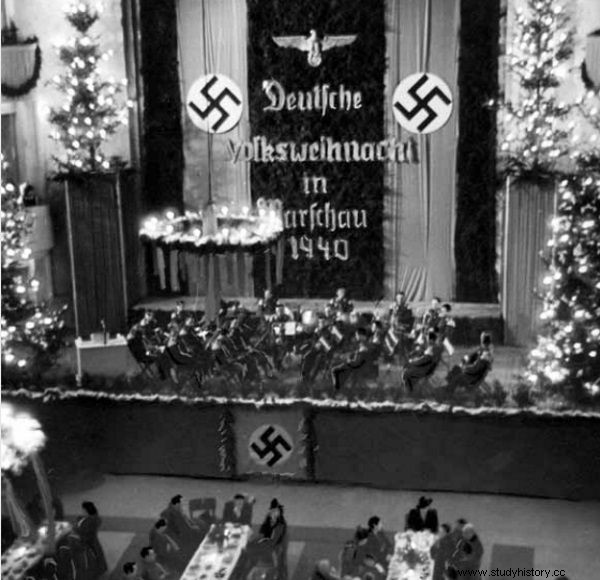
When Poles turned every penny in their hands before spending it, the Germans had no qualms and celebrated Christmas joyfully.
It was impossible to get many standard items on the Christmas Eve menu. There is no herring, and carp and pike are ridiculously expensive? No problem. Finally, stuffed fish can be made without fish. It can be prepared, for example, from boiled soybeans or eggs. Once we managed to get the fish, they were usually smelt - tiny fish, only a few centimeters high, nowadays almost unheard of on sale. The middle of winter is the catch season.
Borscht reigned on many Christmas Eve tables. This fasting soup can be prepared easily and cheaply at home. It is enough to set the leaven in advance and only cook the soup on Christmas Eve. However, it was not the borscht that filled Poles' bellies. During this gala dinner, the tables of the big city hosted ... various varieties of potatoes. Władysław Bartoszewski mentioned it in 1958:
The appetite was satisfied with potato pancakes in oil or simply potatoes with raw onion (vitamins!). A lean cake with card margarine, in which eggs were sometimes replaced with pumpkin or egg powder, served as a festive dessert.
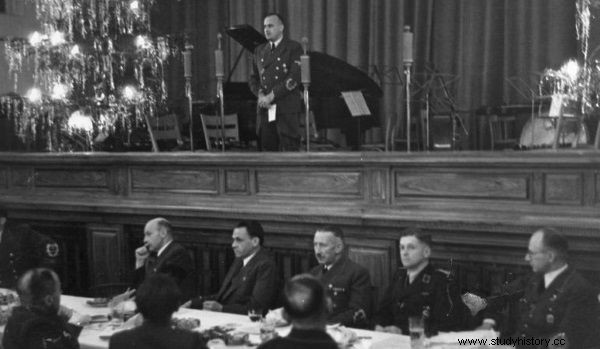
Hans Frank is speaking at the Governorate General Government Christmas meeting.
It was a little better in the provinces. In small towns, where there were many places to grow, it was easier to get food. The Christmas Eve supper could also be experienced in a traditional way:with twelve dishes, a table for a dozen or so people, loud singing of Christmas carols and looking into the barn, whether the animals would start to speak with a human voice. Such holidays from 1941 were remembered by Maria Kwiatkowska, a young girl who was condemned to wandering with her mother and younger brother by the war:
The festive table was set for twenty people, there was fresh hay under the tablecloth and twelve dishes on the table […]. The displaced people had almost nothing, and the hosts - also not too rich - fairly shared what they had.
There were also families that found themselves in a particularly difficult situation due to German actions.
When they had nothing to put into the pot on a daily basis, no one waited with joy for the holidays and no one expected their solemn celebration. The youngest members of such families were particularly affected.
The greatest Christmas anyway?
Sometimes parents who had been working hard all day even made the effort to prepare Christmas in secret from their children. Such holidays were often remembered for the rest of their lives. One of them was described by Anna Rosel-Kicińska.
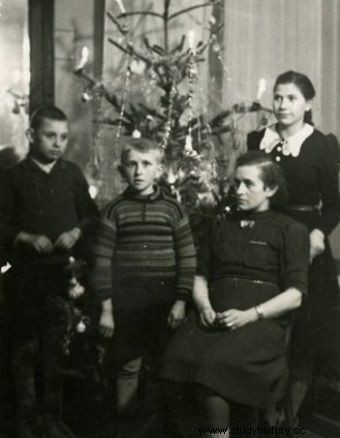
Christmas in the family of displaced persons from Wielkopolska. Christmas in the family of displaced persons from Wielkopolska. (photo is in the collection of Mr. Piotr Balcer.
As a little girl, she and her parents were thrown out of a farm in the new territory of the Reich. In the winter of 1940, just before Christmas, her family was relocated to a poor little room in the forests of the Lublin region. Hunger looked into their eyes very quickly. In the memoirs published by the "My War Childhood" foundation, Rosel-Kicińska noted:
Another occupation Christmas time was approaching. We children walked sad. We knew we had nothing to count on. On the eve of Christmas Eve, our parents put us to bed early, and they were still sitting at the table. I fell asleep, but a rustle woke me up. The lamp was on.
Then I saw that my dad was quietly framing the Christmas tree, placing it on a stool in the corner of our little room. As usual, my mother glued long, long chains out of colored paper and used them to decorate the Christmas tree. Tiny apples were hung on it. We will have Christmas, I thought, and fell asleep happily.
According to Anna Rosel-Kicińska, it was the most beautiful Christmas in her life. The Christmas magic consisted not of the table sagging from the food, the abundance of treasures under the tree and the multitude of lights on it. Thanks to Christmas, Poles took their minds away from everyday life and celebrated the time spent with their families.
One thing was definitely different about this Christmas Eve than it used to be. Shepherdess. The Germans introduced a curfew in the occupied country. Whoever stayed on the roads and streets during its validity without the appropriate permit risked his life. How did Poles reconcile these restrictions with the traditional shepherd mass? And there was a way. The liturgy has been moved to the early morning. That is why in many houses, especially those with more people at the table, they feasted, caroled and politicized until dawn. When the clock struck the right time, the party set off for church. After Midnight Mass, everyone went to their homes and went to bed after a very long night.
***
"Okupacja od Kuchni" is a moving story about the times when illegal pig slaughtering could lead to Auschwitz, vegetables were grown in the courtyards of tenement houses, and used coffee grounds were traded on the black market. It is also an amazing cookbook:full of original recipes and practical tips from 1939-1945. We recommend!
